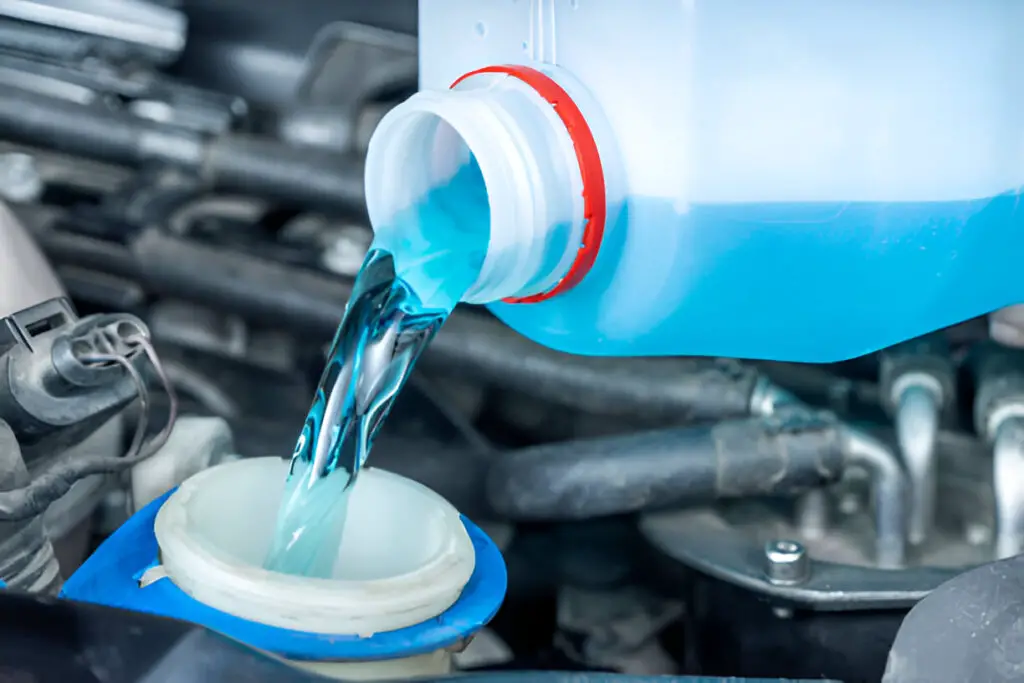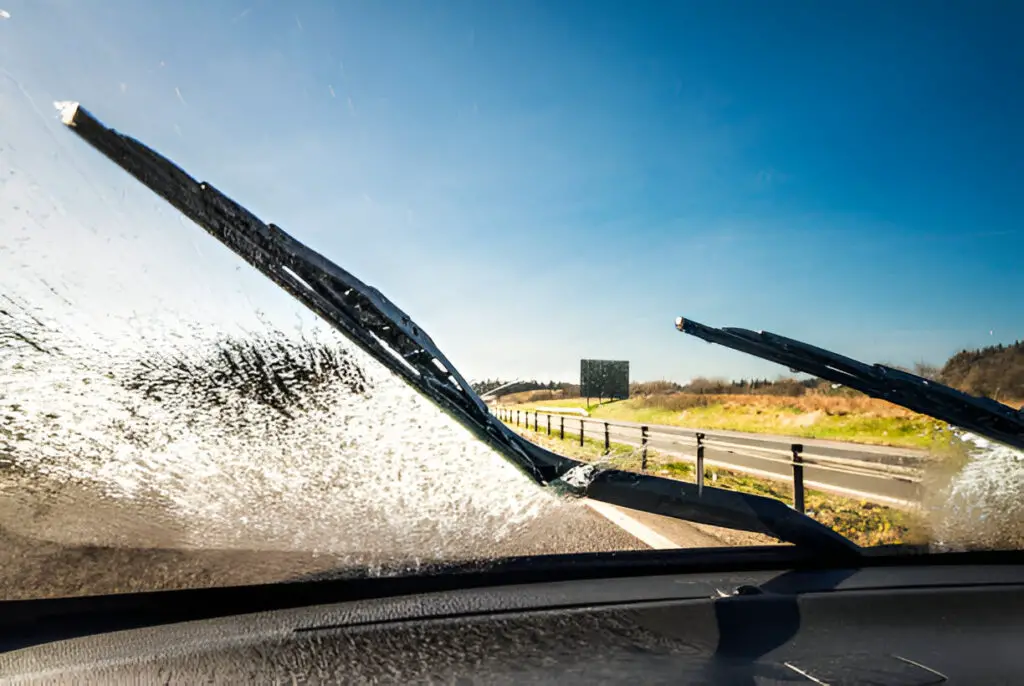Windshield washer fluid can be mildly corrosive due to chemicals like methanol or ethanol, especially in higher concentrations. However, most washer fluids are diluted enough to prevent significant damage to car components like paint, rubber, and metal.
Windshield washer fluid is an essential part of your vehicle’s maintenance, ensuring clear visibility by cleaning dirt, bugs, and debris off your windshield. However, many car owners often wonder about its chemical properties and whether it has any corrosive effects on their vehicles or the environment. In this detailed blog post, we’ll explore the composition of windshield washer fluid, how it interacts with your car, and whether it poses any corrosive risks.

Contents
What is Windshield Washer Fluid?
Windshield washer fluid is a specially formulated liquid used in the windshield washer system to clean the windshield, improve visibility, and prevent smearing. It’s designed to perform well in varying weather conditions, from summer heat to winter snow. There are many types of windshield washer fluids, and they typically consist of a mixture of the following ingredients:
- Water: The base of most windshield washer fluids.
- Methanol or Ethanol: Alcohol is often used to lower the freezing point and help the fluid evaporate quickly without leaving streaks.
- Surfactants: These are cleaning agents that break down grime, oil, and bugs on your windshield.
- Antifreeze agents: To prevent the fluid from freezing in cold weather.
- Dyes and fragrances: Many brands add color or scent to the fluid for aesthetic purposes.
While windshield washer fluid effectively removes grime and improves visibility, concerns about its potential corrosive effects on your car’s exterior, internal components, and the environment are valid.
Is Windshield Washer Fluid Corrosive?
The term “corrosive” refers to a substance’s ability to cause deterioration or damage to another material, usually metals, plastics, or skin. To determine whether windshield washer fluid is corrosive, we need to examine its ingredients more closely.
1. Methanol and Ethanol
Methanol and ethanol, the primary alcohols found in most washer fluids, can indeed have corrosive properties if not properly diluted. Methanol, in particular, is a highly volatile substance, and in concentrated amounts, it can corrode certain types of materials, especially some plastics and metals. However, the concentrations of methanol in windshield washer fluid are typically low (usually around 20-30%) and are diluted with water, which significantly reduces their corrosive potential.
In cold-weather formulations, washer fluids contain higher concentrations of methanol or ethanol to prevent freezing, which could increase the risk of corrosion to certain materials over long periods of exposure. However, modern vehicles are generally designed with components that can withstand exposure to such chemicals, especially in washer systems, meaning the risk of severe corrosion is minimal under normal use.
2. Surfactants and Detergents
The surfactants in windshield washer fluid are mild cleaning agents designed to break down dirt, oil, and organic matter on your windshield. These surfactants are typically non-corrosive to both metals and plastics, as they are formulated to clean surfaces without damaging them. They are similar to the cleaning agents found in household detergents and are generally safe for use on automotive materials.
3. Additives and Antifreeze Agents
Additives like antifreeze agents (usually ethylene glycol or propylene glycol) help lower the freezing point of the fluid. These substances are not typically corrosive in the concentrations used in windshield washer fluid, but over time, they could leave a residue if not properly diluted or rinsed off the car’s surface.
4. Effects on Car Paint and Exterior Surfaces
One of the most common concerns among car owners is whether windshield washer fluid can damage their car’s paint. Generally, windshield washer fluid is safe for automotive paint and will not cause corrosion or deterioration under normal use. However, prolonged exposure to concentrated washer fluid on painted surfaces can sometimes lead to minor discoloration or dulling of the finish, especially if it’s not rinsed off promptly.
To avoid any potential harm to your car’s paint, it’s advisable to wipe off any excess washer fluid that may spill onto the hood or sides of the car during use. Keeping the car regularly washed and waxed can also protect the paint from any long-term effects.
5. Windshield Wipers and Rubber Components
Another concern is whether windshield washer fluid affects rubber parts like windshield wiper blades. While methanol and ethanol can dry out rubber over time, most washer fluids are diluted enough that this is not a significant issue. However, prolonged exposure to concentrated washer fluid can cause wiper blades to crack or wear prematurely. To minimize this, ensure that the fluid is properly diluted and replace your wiper blades regularly to maintain optimal performance.

Corrosion Concerns for Vehicle Parts
While windshield washer fluid is not inherently corrosive, certain parts of your vehicle may be more vulnerable to prolonged exposure, particularly if the fluid is improperly diluted or contains high levels of methanol. Here are some components that may be affected:
1. Windshield Washer System
The washer fluid reservoir, pump, and hoses are generally designed to withstand exposure to washer fluid. These components are usually made from materials like plastic and rubber, which are resistant to the chemicals in the fluid. However, in rare cases, a poorly formulated washer fluid or a high concentration of methanol could degrade these materials over time.
2. Windshield and Wipers
The fluid is specifically formulated to be safe for the windshield. However, if the fluid is not properly wiped off, it can leave streaks, and excessive residue may create a film that can be harder to clean over time.
3. Metal Components
Prolonged exposure to concentrated washer fluid can potentially cause minor corrosion to exposed metal parts, such as the hood or windshield wiper arms. This is more of a concern if the fluid is spilled and not wiped off, or if the car is exposed to large amounts of fluid during the winter without regular washing.
Environmental Concerns
In addition to its impact on vehicle components, there is growing concern about the environmental impact of windshield washer fluid. Methanol, ethanol, and glycol-based antifreeze agents can be harmful to the environment, particularly if they enter waterways. Methanol is toxic to aquatic life, and improper disposal of washer fluid can contribute to water pollution.
For environmentally conscious drivers, there are eco-friendly windshield washer fluids available that use biodegradable and less harmful ingredients. These products are formulated without methanol and instead use ethanol or other alcohols that are less damaging to the environment. Opting for an eco-friendly washer fluid can reduce your environmental footprint without compromising on performance.
Safety Concerns: Is Windshield Washer Fluid Harmful to Humans?
Beyond its potential effects on your vehicle, windshield washer fluid can be hazardous to humans if handled improperly. Methanol, in particular, windshield washer fluid is toxic when ingested, inhaled, or absorbed through the skin. Exposure to methanol can cause symptoms ranging from headaches and dizziness to more severe issues like organ damage if ingested in significant quantities. For this reason, it’s important to handle washer fluid with care.
Here are some safety tips when working with windshield washer fluid:
- Avoid skin contact: Methanol can be absorbed through the skin, so wear gloves when handling it.
- Use in a well-ventilated area: Avoid inhaling vapors, especially in confined spaces.
- Store properly: Keep washer fluid in a sealed container, away from children and pets.
Frequently Asked Questions
Here are some FAQs about windshield washer fluid –
1. Can windshield washer fluid corrode my car’s paint?
Windshield washer fluid is generally safe for automotive paint, but prolonged exposure without washing off excess fluid could lead to minor discoloration or dulling. Regularly washing your car and wiping off excess fluid helps prevent this.
2. Can windshield washer fluid damage my wiper blades?
While diluted washer fluid is safe for most rubber components, repeated exposure to highly concentrated fluid may dry out wiper blades over time. Replacing your wiper blades regularly and using properly diluted fluid can prevent this.
3. Is windshield washer fluid environmentally harmful?
Yes, standard washer fluids containing methanol or other alcohols can be harmful to the environment, especially if they enter water sources. Eco-friendly options are available, which use biodegradable ingredients and are safer for the environment.
4. Can windshield washer fluid freeze?
In cold weather, regular washer fluid can freeze, rendering it useless. Winter-grade washer fluids contain antifreeze agents like methanol or ethanol to prevent freezing and ensure they remain functional in subzero temperatures.
5. Is it safe to make my own windshield washer fluid?
While some people make homemade washer fluid using water and soap, these mixtures may lack the proper cleaning and antifreeze properties. Commercial washer fluids are carefully formulated for optimal cleaning, freeze protection, and safety.
Conclusion
Windshield washer fluid is an essential part of vehicle maintenance, designed to keep your windshield clean and ensure clear visibility. While it contains chemicals like methanol and ethanol, which can be corrosive in high concentrations, the fluid used in most vehicles is diluted enough to prevent significant damage to automotive components when used correctly.
Proper care, regular vehicle washing, and handling windshield washer fluid with care are the keys to minimizing any potential risks to your car, the environment, and your health. If you’re concerned about environmental impacts, consider switching to an eco-friendly windshield washer fluid for a safer, greener alternative.